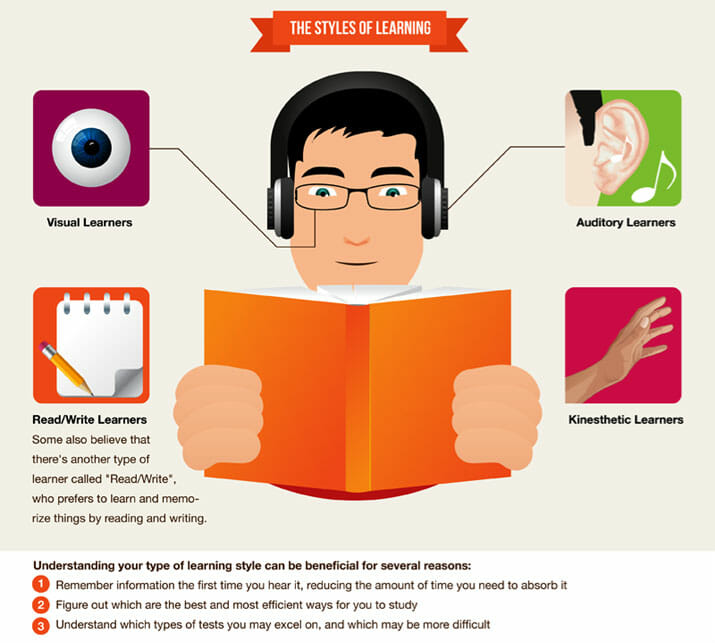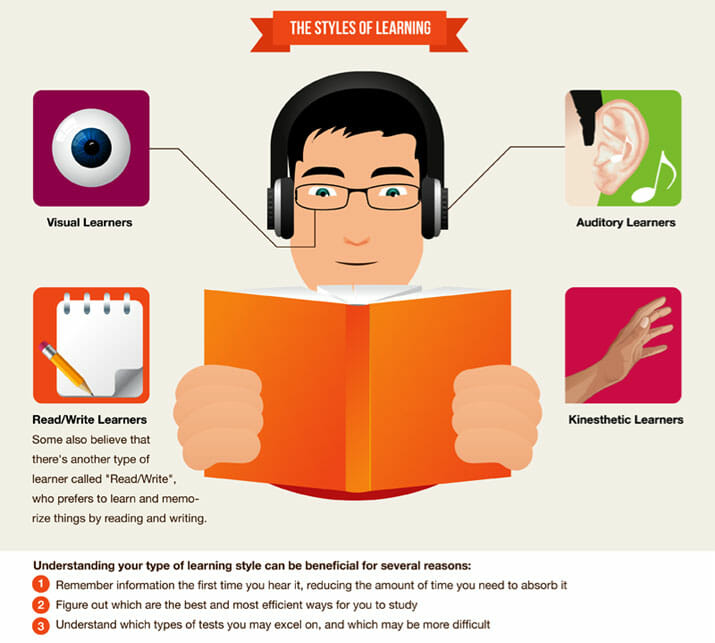
Choosing going back to school as an adult learner can be as overwhelming as it is exciting. Even for those who love learning, the pressure of taking exams, being graded, and writing essays can bring back some anxieties you haven’t felt in years. However, don’t forget that you’ve had more years of work and life experience than students of traditional college age; you know your strengths and weaknesses, which will give you direction and motivation to help steer your education to success.
As an adult learner, you tend to be more self-directed; you have a goal-centered orientation to learning. You know why you’re here, and you have a clear goal that you’re looking to achieve from your studies. So don’t fear the younger minds, because your learning will be more successful if you take an active role in planning, monitoring, and evaluating your education, and steer your education towards the direction where you want your career path to lay.
Know your learning style.
There are three main learning styles that students excel in to different degrees—visual, auditory, and tactile. Visual learners, for instance, learn by reading or seeing pictures, and understand and remember things by sight. They should sit at the front of a classroom so they won’t be distracted by things going on around them; and they will also benefit from using visual aids such as highlighters and diagrams. Auditory learners find soothing music helpful to their study process, and they memorize their material best by explaining it out loud to others. Tactile learners must do things in order to learn—clicking on a computer screen, using sticky notes, and taking exercise breaks are all helpful tools for this kind of learner.
There are many online quizzes you can take to help determine your learning style, and to further find the best study tips and strategies to help you reach the best learning result. Knowing what kind of tactics will help you absorb and remember your learning materials faster can really push your education one step forward.
Spend some time (doesn’t have to be long) to study everyday, and schedule weekly reviews.
Pulling an all-nighter before a test in the hopes of understanding and retaining all information doesn’t work anymore if you’ve past the age of 20; just think about the amount of sleep you’ll loose! As an adult learner, the best way to plan your study is to break down your study time to each day, and pace yourself throughout the week or month.
Aside from spending a certain amount of time learning everyday, you could also schedule a review session of your courses each week. Sit down and review your textbook, your notes, your readings, and your assignments. This will pay off when exam time arrives as the information you reviewed will stay in your long term memory. Cramming only works if you are relying on short term memory. You will later forget most of the material and all that studying will go to waste. Use sensible study techniques to achieve the full benefit of your degree.
Go to class prepared, and take good notes.
Try not to miss a class, or get behind in your assignments. If you get too far behind, it can be difficult to catch up, and using your classmates’ notes to study will never achieve you the same good results as using your own. Don’t go to a class empty-headed; read the assigned chapter beforehand and note any questions before attending class. This will help you develop a pre-structured knowledge base which you will embellish more later on with the explanations given by instructors.
After class, review anything you didn’t understand and talk to the instructor during office hours, look up answers to any quizzes, and tackle the book’s study guide. Use a method of notetaking that makes sense for you during class. The most important practice for effective notetaking is reviewing and editing your notes. Review and edit your notes as soon as possible after classes, and you will find everything you wrote down or edited is imprinted in your head in no time!
Let your experience shine!
Whether you choose to go back to school online or in person, remember that you have a lot to bring to the table. Brush up on your skills and have confidence that you will adapt quickly. From the beginning of your studies, share your thoughts and experiences with other students through classroom discussions and get involved in campus activities.
You’ll soon find that being able to meet people of various ages, from different backgrounds and with different types of experiences can really connect you with new industries very quickly. Adult students can impact their wisdoms gained from past experiences amongst each other, and build networks and relationships that potentially lead to future opportunities. Your experience and life story might just become one of the most valuable things some other students took home from their education.
Always take time to maintain balance in your life.
By going back to school you are beginning an exciting and extremely rewarding journey, once again. Reflect on the fact that the best part of an education is not the destination but the journey itself. Manage your time wisely and don’t let unnecessary stress bring you down.
Take time to make to-do lists; prioritize things that are most important to you; and balance work, family, and leisure to avoid stress and academic burn-out, as well as maximize your learning potential. If you have families commitments, especially children to take care of, try do your homework at the same time and in the same space as your kids. This will create “homework time” in your family, which is a success strategy for both adult learners and young students; because what’s more fun than learning and improving together with you kids?
As the largest career college in Canada with 50 campuses across the country, Academy of Learning College attributes the growth in our success to identifying the gap between the formal education available and the realities of the working world. We fulfill the needs of learners by developing customized programs for each student, while meeting the requirements for convenient and effective training at an affordable cost. Browse our program list by province and find the best program that suits your needs!







